|
1.
CENTRAL/ WEST AFRICA
Mixed changes in log prices as demand fluctuates
Over the past fortnight, log prices fluctuated with supply
and demand. Although demand from China was
reasonably firm and prices slightly higher, some observers
in the West African timber exporting countries hinted at
lower expectations in the coming months as the recession
in many major consumer countries began more seriously
to affect China¡¯s exports. Vietnam was still an active
buyer and India also bought at normal volumes. Log
markets in Europe were very limited and in small volumes
for Italy and the Netherlands. Demand for okoume was
only from China in the usual grade mix with no demand
for individual grades from Europe.
Sawn lumber markets were very limited and prices
unchanged, possibly because of very low or no demand,
and Europe was particularly depressed. Sapele was still a
special case with producers reported to be accepting any
reasonable offer, while importers and merchants were still
selling off existing stocks at below costs. Some reports
indicated more difficulties for exporters in finding buyers
willing to pay higher prices for certified timber species
such as sapele, sipo and azobe where there were said to be
relatively high stocks remaining with producers.
Some West African producers were uncertain whether
even the current lower trade levels could be maintained
over the second quarter. Continental Europe has the
advantage of a strong euro and some countries were
proposing to assist the building and housing sectors by
bringing forward the implementation of already planned
government funded construction projects. Whether the
financial situation will be positive enough to fund any of
these in a realistic time frame remains to be seen.
ITTO holds national investment forum in Congo
The ¡®National Forum to Strengthen Policies and
Opportunities for Forest Investment in Congo¡¯ was held
from 17-19 February 2009 in Brazzaville, Congo. The
Forum was attended by more than 75 participants
representing the private sector, development banks, civil
society and economic authorities from the government.
The forum was inaugurated by the Minister of Equipment
and Public Works, Mr. Florent Tsiba, who highlighted the
need for responsible participation from different
stakeholders in order to analyze options for economic
development of Congo¡¯s forest resources and elaborate an
action plan to guide strategies and identify financial
mechanisms for the development of the sector in the
medium and long-term.
The Minister also highlighted that the Forum was timely
and would enable participants to examine the impact of the
international financial crisis on demand for tropical wood
and wood products in order to develop appropriate
responses, re-orient commercial policies, develop local,
regional and intra-African markets, and manage the forests
using an integrated approach. The Minister recognized that
a Plan of Action should strengthen Congo¡¯s forest policy,
raise business and managerial capacities of small and
medium enterprises (SMEs) and encourage banks to play a
more active role in the sector¡¯s development.
The ITTO Regional Officer for Africa, Mme. Celestine
Ntsame-Okwo said the forum was an excellent opportunity
to follow-up on the recommendations of the Ministerial
Conference for the Promotion of Value-added Processing
of Tropical Wood in Africa, held in Libreville in March
2003, and the ITTO regional investment forum held in
Accra, Ghana in August 2007. From the private sector, the
representative of the Professionals and Patronal Union of
Congo (UNICONGO), Mr. Alphonse Missengui, noted
Congo was facing difficult economic times due to falling
oil prices as well as the crisis faced by the forest industry,
a sector historically important to the national economy. He
also recognized that the forest sector has not reached its
economic potential, as the second largest natural resource
of the country.
Resulting from the National Forum, a National Action
Plan for Promoting Investment was adopted with the
following themes: promotion of sustainable forest
management; development of human resources;
development of the national market; formulation of
coherent policies and laws; promotion and development of
SMEs and modernization of the artisanal wood sector;
creation of an adequate banking system; and
diversification of the use of forest and forest products. The
Forum also offered recommendations for the immediate
implementation of the Action Plan, including: improving
macroeconomic conditions in order to promote investment
in the forest sector in light of its cross-cutting nature;
helping SMEs to increase management and technical skills
for personnel; and supporting small forest producers
through favorable interest rates. The Forum presentations,
reports from the working groups and the Action Plan are
available on the ITTO website.
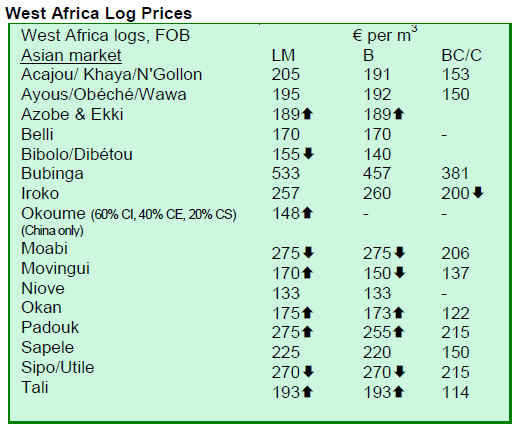
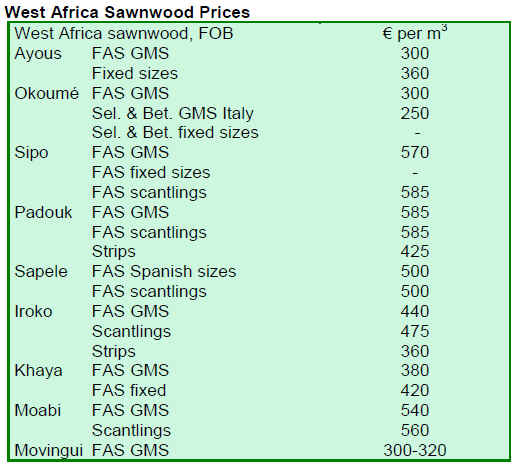
2. GHANA
Ghana launches Electronic Export Permit system
The Customs Excise and Preventive Service (CEPS), in
consultation with the Timber Industry Development
Division (TIDD) of the Forestry Commission (FC),
announced the establishment of the Electronic Export
Permit system through the Ghana Community Network
(GCNet) and Ghana Customs Management System
(GCMS). The new system was launched in Takoradi on 11
March 2009, after which all declarants / exporters applied
for their export permits to the TIDD through the
GCNet/GCMS.
The new system was implemented after evidence of the
increasing abuse by exporters using previous practices,
which allowed the exporter to manually develop and
complete export permit invoices for vetting and approval
by TIDD. The Contract and Permit Manager of TIDD, Mr.
Henry Coleman, at a May 2008 workshop for forwarding
agents, shipping companies, the Ghana Ports and Harbors
Authority, and banking officials, hinted at the new permit
system, which he said would have enough security
features to check forgery and other problems in the timber
transaction process (see TTMR 13:9). The pilot project for
the submission of Electronic Export Permits started in
Takoradi on 7 August 2008.
The electronic process begins with the clearing agent and
forwarder. Acting on behalf of the exporter as part of a
one-stop ¡®single window¡¯ process, the declarant/exporter
applies electronically to TIDD as part of an export
declaration to CEPS. After satisfying the relevant
requirements, the request is approved by TIDD and the
permit is sent electronically to the agent who uses the
permit number generated to send a declaration. Copies of
the approved permits are sent electronically to CEPS,
which are checked against the copy presented by the
exporter during document verification.
New ministers take office
The Timber Workers Union (TWU) of Ghana has
congratulated the newly elected Minister for Lands and
Natural Resources, Alhaji Collins Dauda, on his election.
In discussions with the Minister, the Union explained its
work on a 640-acre forest plantation, which is designed to
boost the country¡¯s forest resources. Parliament has also
approved Mr. Henry Ford Kamel as the Deputy Minister
for Lands and Forestry.
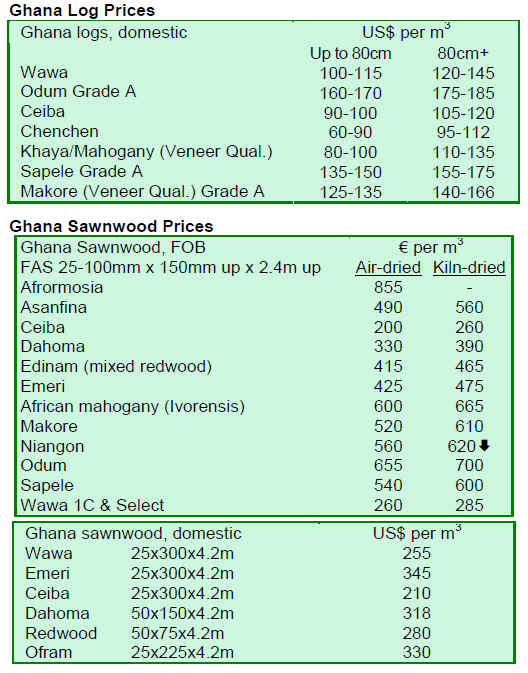
3.
MALAYSIA
Furniture manufacturers resist foreign worker levy hike
Malaysian furniture manufacturers appealed to the federal
government not to increase the levy on foreign workers
under the second stimulus plan, reported The Star. The
federal government had earlier announced that the current
levy imposed on foreign workers would be doubled in
order to create more employment opportunities for local
workers.
According to the president of the Malaysia Furniture
Entrepreneurs Association, Mr. Desmond Tan, the levy
would have an adverse effect on the furniture
manufacturing sector as most local workers are not keen to
take up employment in furniture production lines.
Furniture manufacturing is very labor intensive in
Malaysia and its survival dependent on foreign workers.
Mr. Tan said the government should reduce or abolish the
levy altogether as the global recession continues to bite
deeper into the industry.
Call for second stimulus plan to aid furniture sector
Furniture manufacturers in Muar, a major furniture
manufacturing zone with 200 factories in the state of
Johor, called on the federal government to put the second
stimulus plan of RM60 billion to work as soon as possible.
The Star reported that some manufacturers were beginning
to reduce working hours as well as cut production as a
result of the slowdown. RM15 million has been set aside
for the timber sector¡¯s utilization and will be managed by
the Malaysian Timber Industry Board (MTIB).
FRIM area to be declared a national heritage
The Forest Research Institute of Malaysia (FRIM) and the
486 ha of man-made forest surrounding the institute will
be recognized as a national heritage in 2009, according to
its Director-General, Dr Abdul Latif Mohmod. As noted in
The Star, 15 million trees from 2,500 species are growing
in the institute¡¯s man-made forests. The new
categorization of the forests will enable FRIM to further
enforce protection of its resources under federal laws.
Prices remain weak as timber market struggles
Prices of Malaysian timber products continue to be weak
as doubts over the second stimulus plan continue to affect
the private sector. According to local news sources, a bulk
of the stimulus package will be used to upgrade schools,
police-stations and mosques. Another portion may be used
to rescue government-linked companies. Some experts
fear not much of the funds from the second stimulus plan
may eventually filter down to the private sector, especially
to small and medium-sized industries.
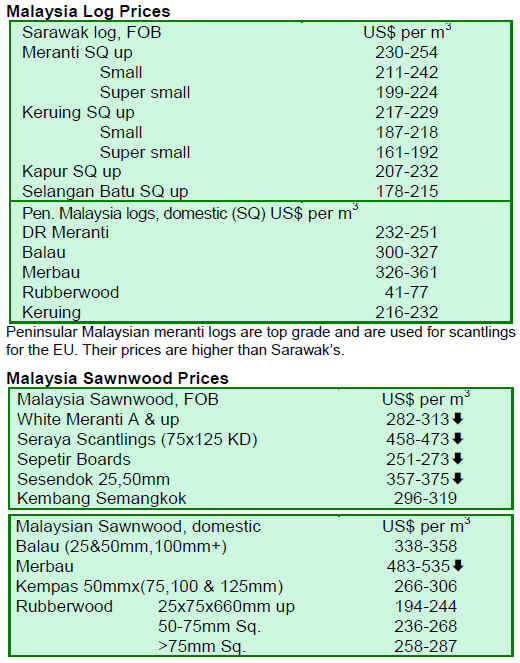
4.
INDONESIA
ICC urges swift construction of storage facilities
As noted in Tempo Interactive, the Indonesian Chamber of
Commerce (ICC) urged the federal government to step up
the construction of timber storage facilities for several
provinces in Indonesia. Mr. Rahmat Gobel, vice-chairman
of the ICC, noted the facilities would help reduce
production costs and improve the competitiveness of the
Indonesian furniture and handicraft industry. He added
that timber storage facilities for East Java, Central Java,
Sulawesi, and Papua would significantly reduce the
amount of levies charged as well as facilitate certification
of timber in storage facilities.
Sales of forestry equipment plunge for PT United Tractors
Sales of heavy equipment to the forestry declined sharply,
with one of Indonesia¡¯s major heavy equipment suppliers,
PT United Tractors, announcing a 96% drop in sales.
Similar declines in sales were recorded for the mining,
agriculture and construction sectors, according to Antara
News.
Bank Indonesia takes steps to safeguard Indonesian economy
Mr. Hartadi A. Sarwono, Deputy-governor of the
Indonesian central bank Bank Indonesia (BI), commented
that BI would not allow the Indonesian rupiah to
depreciate in order to boost exports. As reported in The
Jakarta Post, Hartadi said such measures would not
necessarily boost demand for Indonesian goods.
Moreover, this course of action could carry risks as well,
as most of Indonesia¡¯s foreign debts are in US dollars.
According to The Jakarta Globe, BI has also signed a 100
million yuan (USD15 billion) currency swap with the
People¡¯s Bank of China. This is the largest currency swap
ever signed by Indonesia. The swap agreement was
expected to increase trade and direct investment between
the two countries. According to statements released by BI,
it will also help stabilize the Indonesian money market and
ease foreign exchange liquidity.
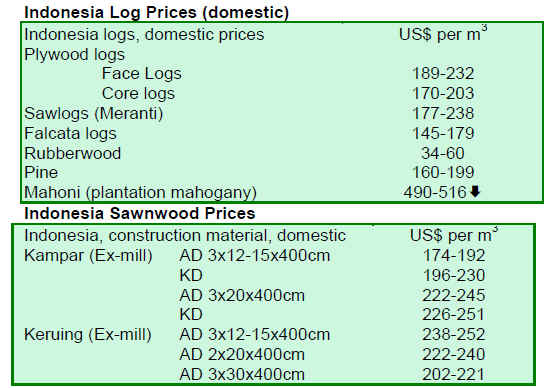
5.
MYANMAR
Market slows ahead of new year holiday
Although this report was prepared before the late March
tenders, the market was expected to be moving slow, with
not many new purchases being made. Additionally, not
much business was expected to be conducted during the
New Year holiday, from 11 to 21 April 2009. Given the
on-going economic downturn, sales are expected to be
even slower than usual during the holiday period.
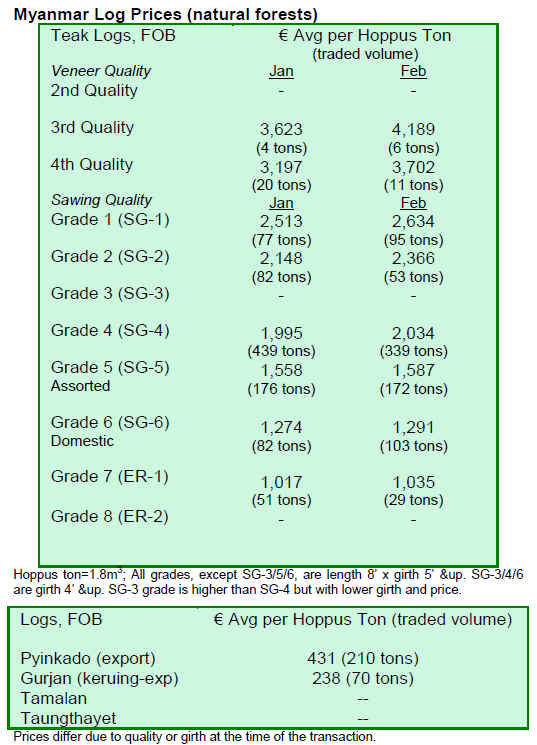
6. BRAZIL
Demonstration over Arco de Fogo calls attention to
economic needs
According to Folha da Mata Online, a year after the ¡®Arco
de Fogo¡¯ illegal logging investigations in the municipality
of Tailândia (state of Par¨¢), the local government and civil
society has organized a demonstration against the
consequences of the operation. According to the Secretary
of Science, Technology and the Environment, nothing has
been done by the state and federal government to develop
new economic and sustainable activities in the affected
regions, which have depended on the charcoal companies
and sawmills now closed as result of the ¡®Arco de Fogo¡¯
operation. Just after the investigations, a committee was
established for the economic development of the
municipality, but it was dissolved soon after. A new
committee has been set up under a new local
administration.
The population was searching for economic alternatives
for local people in the aftermath of the operations. The
state government announced measures for some Par¨¢ mills
to help companies in times of crisis. Nevertheless, some of
these measures had previously been adopted, including
machinery and equipment tax exemptions and the
establishment of a Forest Sector Technical Chamber.
The new measures presented in the beginning of 2009 are
important to strengthen the forestry activity statewide. Part
of the action involves implementation of forest harvesting
plans, a proposal submitted to governmental agencies at a
competitiveness forum in the State of Par¨¢ in February
2009. However, the lack of specific deadline for the
approval of forest management and reforestation plans by
the state environmental agencies makes it difficult for
companies to plan in advance.
To this end, the State Secretary of the Environment
(SEMA) has been encouraged to speed up the issuance of
environmental permits for projects submitting plans for the
first half of 2009 within the 20-day period set by the
agency for reforestation and 40 days for forest
management.
Surveys indicate increasing layoffs
A survey of industrial employment by the Brazilian
Institute of Geography and Statistics (IBGE) indicated the
number of workers employed in the timber industry in the
Southern Brazilian state of Paran¨¢ in December 2008 was
21% lower than the same month of the previous year.
Paran¨¢ Online reported the declines reflect an
unprecedented crisis in the sector beginning with the
drastic devaluation of the US dollar in 2007. Data from the
General Registry of Employed and Unemployed
(CAGED) of the Ministry of Labor and Employment said
there were 3,713 layoffs in December 2008, compared to
only 1,128 new workers. When added to the number of
layoffs in November, the total reached 3,447 jobs lost by
the end of 2008.
A wave of layoffs seems to be spreading in 2009. The
Union of Carpenters in the São Jos¨¦ dos Pinhais
municipality (inside the capital metro area of Curitiba), for
instance, reported between 200-500 layoffs per week. The
Union, which includes 10 municipalities in the Southern
Metropolitan Region of Curitiba and the municipalities of
Campo do Tenente and Rio Negro, the regions with a high
concentration of plywood production, has been seriously
affected by the crisis.
Brazil¡¯s February 2009 exports register slump
Brazil¡¯s wood products exports (except pulp and paper)
from February 2009 dropped 43.5% by value compared to
the same period in 2008. The charts below show the
volume and value of Brazil¡¯s exports for the month of
February 2009 compared to the same month a year earlier:
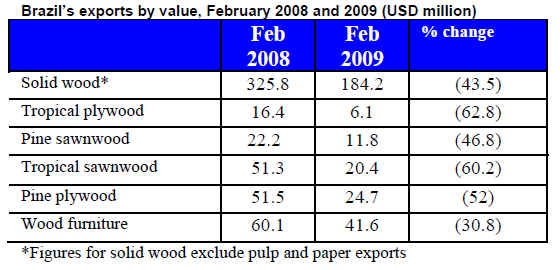

Arab markets support increase in Brazilian timber
exports
Brazil¡¯s current trade with Arab countries was presented to
timber companies of Northern Mato Grosso in the first
week of March 2009 at the Union of Timber Industries
(SINDUSMAD). The Arab-Brazilian Chamber of
Commerce discussed possible ways for entrepreneurs to
negotiate with the Arab countries to maximize access to
their markets. Exports of Brazilian companies to Arab
countries totaled USD83.5 million in 2008.
The idea is to show the opportunities to local business and
companies all over Brazil. The Sinop furniture cluster in
particular has the potential to gain a significant share of
the import market for timber products. The Arab-Brazilian
Chamber of Commerce said the participation in
international exhibitions and trade fairs would help
promote the quality of the Brazilian timber and act as a
first step to strengthening trade relationship between the
Arab countries and timber producers from Sinop.
The timber product imports are still a small share of the
total imports in Arab markets. Morocco, Saudi Arabia, the
United Arab Emirates and Egypt are major timber product
buyers. The timber producing companies of Northern
Mato Grosso have already sent a large portion of their
exports to Belgium, England, Spain, Canada and the US.
Plywood and sawnwood are the main traded products. In
2008, sawnwood exports dropped 20.7%, or USD81
million; export of low quality sawnwood increased 43%,
totaling USD5.2 million.
Furniture manufacturers hopeful for growth in sector during 2009
Furniture manufacturers of several states will have a rough
indication of 2009 production from a local furniture fair in
Arapongas, a furniture cluster located in the Northern part
of the state of Paran¨¢, the second largest furniture
producing area in Brazil. Large retailers of the country and
23 importers will attend the Movelpar furniture fair in
Arapongas, where 190 exhibitors are expected to
participate. The target is to reach BRL 400 million in trade
deals, 30% more than the 2007 Movelpar fair.
According to the Brazilian Association of Furniture
Companies (ABIMOVEL), the revenue of the furniture
sector increased from BRL 22 billion in 2007 to BRL 27
billion in 2008 due to an increase in domestic market
demand, which showed positive trend in the first nine
months; although this trend reversed after September
2008. Production decreased 16.2% in December 2008,
contributing to a 1.3% decrease over the year and a
reduction in the number of employees by 11.9%.
Currently, nearly 10% of domestic production is exported,
with overall exports expected to be lower in 2009.
Nevertheless, there is a strong optimism from producers
that figures for furniture exports will improve in 2009,
with some projecting growth of 3% to 5%. According to
ABIMOVEL, gains for the sector are expected in the
second semester.
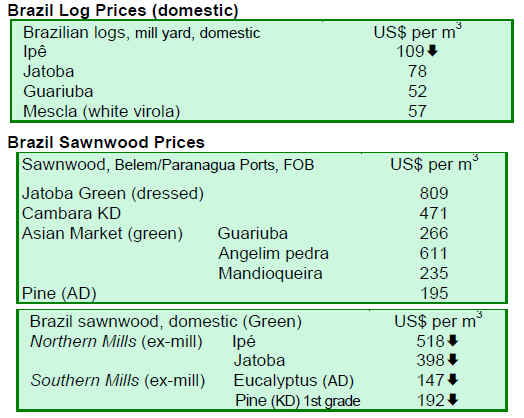
7.
PERU
Agriculture and Labor Ministries¡¯ initiative will create
44,000 jobs
Peru¡¯s Agriculture Ministry, in cooperation with the Labor
Ministry, has launched the National Forestation
Campaign. The programme will involve the planting of
over 40 million tree seedlings that would create nearly
44,000 temporary jobs in Cajamarca, Ayacucho Cusco,
Ancash and Jun¨ªn. The Labor Ministry is also expected to
contribute nearly 15 million Peruvian soles to implement
the programme and help raise incomes at the local level.
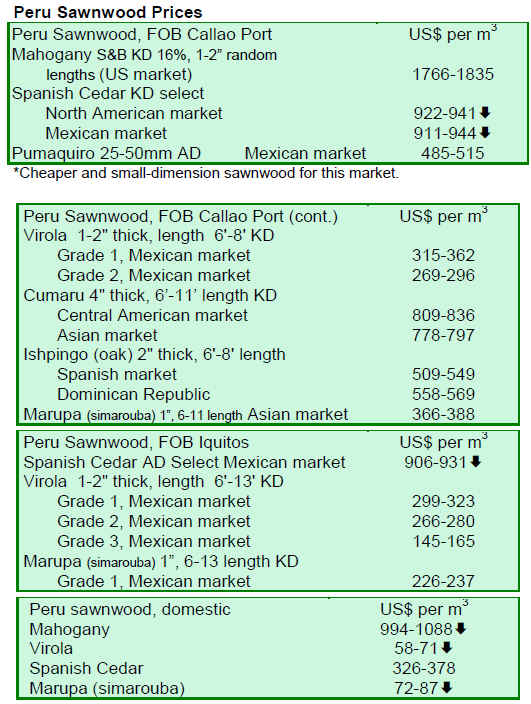
8. BOLIVIA

9.
Mexico
Head of CONAFOR resigns
The general manager of The National Forest Agency
(CONAFOR), Jose Cibrian Tovar, presented his
resignation effective Saturday 14 March 2009. Official
notices did not explain the reasons for his resignation.
However, local news reports indicated that Cibrian
resigned after CONAFOR failed to meet targets set to
replant trees in the country under its ProTree programme.
The Ministry of Environment and Natural Resources
(SEMARNAT) indicated that Carlos Rodriguez
Combeller, the acting Director General, will replace Mr.
Cibrian. Rodriguez has 30 years experience in public
service at the state and federal levels, and has worked for
CONAFOR during the last eight years.
Deadline for ProTree support requests set for 1 April 2009
The owners of land and forest zones looking for support
from the ProTree programme for forest development,
commercial forest plantations, competitiveness, fires and
environmental services, must submit their requests to the
nearest CONAFOR office before 1 April.
At the conclusion of the first open call for support under
the ProTree programme, CONAFOR registered demand
for 62,298 conservation and forest restoration activities in
the country. A major portion of the requests were
generated in the states of Tabasco, Veracruz, Chiapas,
Coahuila, Jalisco, San Luis Potosi and Chihuahua.
10.
Guyana
Guyana¡¯s forests set to attract new investments
Guyana¡¯s Head of State is pushing for a revitalized
economy based on new streams of investment and revenue
from the carbon credits market. President Jagdeo disclosed
that the country is looking to large-scale investments in
agriculture, forestry and mining, all of which have valueadded
potential. The President was speaking ahead of his
current two-week visit to the Middle East, where it is
hoped he can access new sources of investment. Guyana
has already gained support for preserving its rainforests as
a key factor to mitigating the adverse effects of climate
change, a model that is being used by other countries with
standing natural forests.
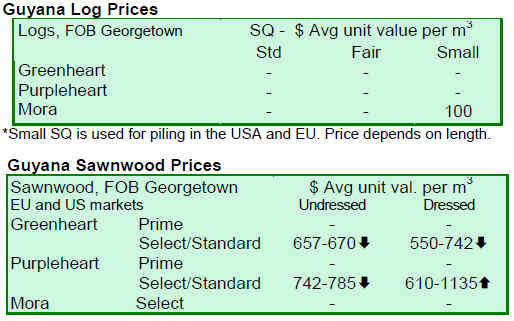
|